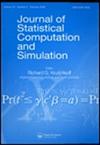Bayesian and likelihood estimation of multicomponent stress–strength reliability from power Lindley distribution based on progressively censored samples
IF 1.2
4区 数学
Q4 COMPUTER SCIENCE, INTERDISCIPLINARY APPLICATIONS
Journal of Statistical Computation and Simulation
Pub Date : 2023-11-07
DOI:10.1080/00949655.2023.2277331
引用次数: 0
Abstract
AbstractIn this article, the problem of estimation of reliability of a ℓ-component system when both the stress and strength components are assumed to have a power Lindley distribution is discussed. The multicomponent stress–strength reliability parameter is obtained using both the Bayesian and the classical approaches when component-wise each unit follows a power Lindley distribution. To estimate the multicomponent stress–strength reliability parameter under the classical approach, the method of maximum likelihood and the asymptotic confidence interval estimation method are used as point and interval estimation methods, respectively. Under the Bayesian paradigm, the reliability parameter is estimated under the linear exponential loss function using the Lindley approximation, the Tierney–Kadane approximation and the Markov chain Monte Carlo (MCMC) techniques and subsequently highest posterior density credible intervals are obtained. To validate the efficacy of the proposed estimation strategies, a simulation study is carried out. Finally, two real-life data sets are re-analysed for illustrative purposes.KEYWORDS: Power Lindley distributionprogressive censoringmulticomponent stress–strength reliabilitymaximum likelihood estimationBayesian estimation AcknowledgementsThe authors are grateful to the Editor-in-Chief, Associate Editor and the learned reviewers for their insightful and constructive comments that led to possible improvements in the earlier version of this article.Disclosure statementNo potential conflict of interest was reported by the author(s).基于渐进式截尾样本的功率林德利分布多分量应力-强度可靠性的贝叶斯和似然估计
摘要本文讨论了假设应力分量和强度分量均为幂林德利分布时的系统可靠性估计问题。在各部件服从幂次林德利分布的情况下,采用贝叶斯方法和经典方法得到了多部件应力-强度可靠度参数。为了估计经典方法下的多分量应力-强度可靠度参数,分别采用极大似然法和渐近置信区间估计法作为点估计方法和区间估计方法。在贝叶斯范式下,利用Lindley近似、Tierney-Kadane近似和Markov链蒙特卡罗(MCMC)技术在线性指数损失函数下估计可靠性参数,从而获得最高后验密度可信区间。为了验证所提出的估计策略的有效性,进行了仿真研究。最后,为了说明问题,重新分析了两个真实的数据集。关键词:功率林德利分布渐进式审查多分量应力-强度可靠性最大似然估计贝叶斯估计致谢作者感谢主编,副主编和博学的审稿人,他们有见地和建设性的意见,导致本文早期版本可能的改进。披露声明作者未报告潜在的利益冲突。
本文章由计算机程序翻译,如有差异,请以英文原文为准。
求助全文
约1分钟内获得全文
求助全文
来源期刊

Journal of Statistical Computation and Simulation
数学-计算机:跨学科应用
CiteScore
2.30
自引率
8.30%
发文量
156
审稿时长
4-8 weeks
期刊介绍:
Journal of Statistical Computation and Simulation ( JSCS ) publishes significant and original work in areas of statistics which are related to or dependent upon the computer.
Fields covered include computer algorithms related to probability or statistics, studies in statistical inference by means of simulation techniques, and implementation of interactive statistical systems.
JSCS does not consider applications of statistics to other fields, except as illustrations of the use of the original statistics presented.
Accepted papers should ideally appeal to a wide audience of statisticians and provoke real applications of theoretical constructions.
 求助内容:
求助内容: 应助结果提醒方式:
应助结果提醒方式:


